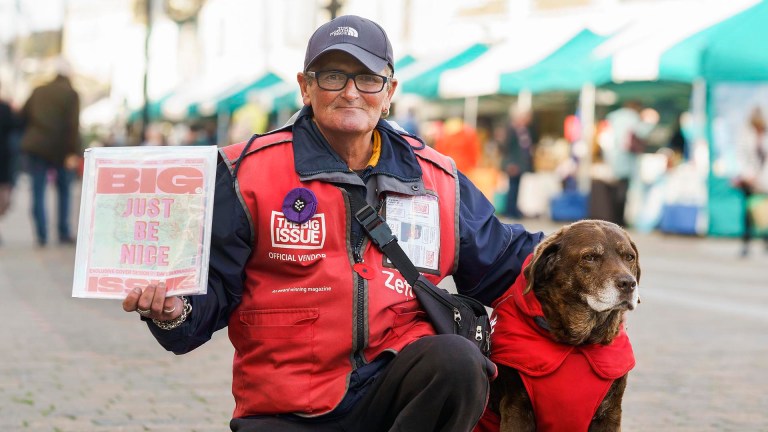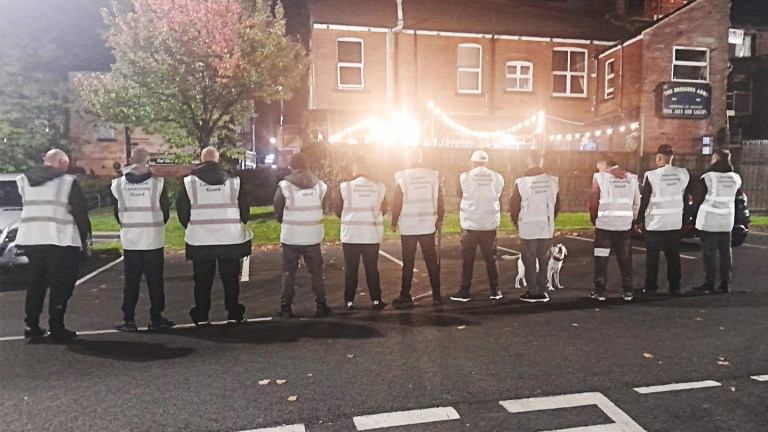That means that they will be working with 34 schools in the area, up from 21, and that has seen the independent foodbank lean even more heavily on crowdfunding to keep up with demand.
In 2018, they raised £7,500 towards their £9,000 costs. This year that target has increased to £15,000 to meet the expected rise in uptake.
Emma Greenough, The Welcome Centre fundraising manager, said: “The Welcome Centre has seen a 50 per cent increase in referrals in the last year alone so our resources are no bigger, we have no more space or volunteers but we are taking on more referrals.
“We absolutely shouldn’t have to be crowdfunding but it isn’t going to change any time soon. The introduction of Universal Credit has had the biggest impact we’ve seen in a long time.”
LunchBox at FACES, Bedford
FACES (Family and Children Early Help Service) has had such an impact in Bedford that they are being honoured this week after receiving The Queen’s Award for Voluntary Service.
Advertising helps fund Big Issue’s mission to end poverty
The charity identifies gaps in services and works to solve them. That led to LunchBox launching last year to take aim at holiday hunger.
The volunteer-run offering is a cafe in all but name, designed to give kids food and activities without a “stigmatising” effect.
Last year the programme provided 700 meals to kids but this year they will be feeding families as well.
And in a heartwarming turn of events, the nearby private Polam School donated more than £1,000 to help make LunchBox happen.
“What was nice about this is that it was fairly privileged children who chose this project and it was the most they had ever raised,” said FACES chief executive Wendie Harvey. “It was the children who understood that not all children have what they have.
“I’ve been working in the voluntary sector for over 20 years and this is a completely different ball game to when I started.”
Advertising helps fund Big Issue’s mission to end poverty
HWB Abertawe, Swansea
Health and Wellbeing (HWB) Abertawe takes a fresh approach to tackling holiday hunger, giving Swansea parents the skills they need to cook healthy meals on a budget.
The aim of the free six-week programme, administered by Swansea voluntary charity SCVS and funded by the Big Lottery, is to provide training to boost families’ resilience and reduce their dependence on food parcels.
The ‘Surviving School Holidays’ workshop is a two-hour weekly programme delivered by experienced healthy lifestyle officers that comes with meal plans and guidance on preparing a shopping list plus tips on boosting physical activity.
HWB Abertawe project coordinator Amanda Edwards told The Big Issue that the programme has had a good response after being piloted last year.
She said: “It’s more about trying to increase the resilience of families so they have the tools to help themselves. That’s what the whole project is about. For a lot of families it is not about ignorance, it’s out of lack of education or skills. We’re now working with a third generation of families who have not worked from scratch. When you go in to upskill them and increase their knowledge, it is completely free and there are no barriers to them. We try to have a holistic approach to the issue.”
Advertising helps fund Big Issue’s mission to end poverty
Akshaya Patra Foundation, London/Midlands
While the Akshaya Patra Foundation initially set out to provide school meals in India, the scale of the holiday hunger issue in the UK drove them to focus efforts on this country too.
The charity provides hot vegetarian meals to more than 1.8 million children every day in the UK, an achievement that saw them recognised as the BBC’s Global Food Champion in June.
Akshaya Patra associate director Radhika Iyer told The Big Issue that they are now serving 3,000 meals to people daily in the UK and will be providing food to tackle holiday hunger in various locations across London and in Leicester over the summer holidays.
That is in addition to the state-of-the-art kitchen they are building in Watford.
“We were originally set up to work in India but what became sadly apparent is the amount of holiday hunger in the UK,” said Iyer. “While the UK seems quite a strange place to start as a developed country, it’s just so ironic that this country has this basic problem feeding its children over the summer.
Advertising helps fund Big Issue’s mission to end poverty
“The idea for us is not just to put food on the plate. It is to transform children’s relationship with food to try and identify what is good for them and not good for them – especially when they are hungry and that makes them vulnerable because they will eat what is available. That’s the gap we are trying to fill.”
Food Cardiff @ the Wild Thing cafe, Cardiff
Before Lauren Saunders founded Cardiff’s Wild Thing cafe, a vegan eatery set up to fight climate change and end food poverty, she was a Big Issue outreach worker in Swansea. Now, she has teamed up with local charity Food Cardiff to bring a pioneering event to the people in her neighbourhood who need it most over the holidays.
The cafe will host a free community supper club which will use excess food from that day’s business as well as fruit and vegetables from local allotments to put on a spread for struggling locals.
Nearby schools are getting involved too. Lauren will be working with pupils enrolled on school holiday programmes created to teach them how to take a truly healthy, environmentally friendly approach to food (including taking them on trips to local allotments). Those pupils will be invited to join the free supper too, replacing one of the meals they would have got during a day at school.
“We’re aiming to end food poverty and holiday hunger as well as tackle food waste and allotment glut,” Saunders explained. “All while creating a space for members of the community to eat and enjoy an evening meal together.”
Advertising helps fund Big Issue’s mission to end poverty
The event will take place on August 12. For more information, including plant-based recipes for those on a budget, visit wildthingcardiff.com
Holy Trinity Night Shelter, Bishop’s Stortford
Bishop’s Stortford in Hertfordshire is an affluent town, but the wealth gap is vast.
That’s why the Holy Trinity Night Shelter has harnessed the help of the local foodbank and the Salvation Army to ease the holiday pressure on parents’ purses
For the rest of the summer, they’ll be providing free lunches on Mondays and Fridays to children and their parents (while the Salvation Army will be helping families get good-quality school uniforms).
Operations manager David Perry told The Big Issue: “We have a great relationship with our local M&S, Waitrose and Tesco stores where we collect any food that has passed its best-before date, mainly fresh fruit and vegetables, as well as bread, pastries and even flowers – they can really put a smile on someone’s face.”
Advertising helps fund Big Issue’s mission to end poverty
Between 150-200 children in the area receive free school meals during term time, though Night Shelter staff know of many more who are frustratingly ineligible and struggle to stay fed year-round.
Lunch Bunch started last Friday and will run at Holy Trinity church for six weeks and in the Methodist Church hall for five weeks.
Five Lamps
In Stockton-on-Tees even an ethical lending company feels a duty to tackle holiday hunger head-on.
Five Lamps – an organisation backed by our social investment arm, Big Issue Invest – offers a range of services to disadvantaged people, including financial inclusion initiatives and loans that won’t trap people in cycles of debt.
But the Five Lamps free breakfast club will run for a second year in 2019 – and this time staff won’t be shocked by demand. “We were expecting to cater for around 40 young people over the summer,” marketing manager Amy Baker said. “But by the end of the six weeks we had had more than 200 young people through the door, plus their parents.” The breakfast club was initially funded by a local authority grant but was forced to rely on donations.
Advertising helps fund Big Issue’s mission to end poverty
“There was a bit of stigma around it with people saying ‘I’m not going, people will think I can’t afford to feed my kids, I’ll get them taken off me,” Baker continues. “So what we’ve done is focused it on the activities that children want to engage with.”
While getting a healthy meal and alleviating parents’ summer money worries, children can take part in everything from slime-making to outdoor games. Some parents have said their children are desperate to go to the sports or dancing camps they see their better-off peers attending during the summer, but that fees are astronomical. So Five Lamps have a street dancing company coming to the breakfast club two days a week, and circus skills on offer too.
The organisation runs local youth clubs and brings some of the same young people in for the breakfast club. But the staff discovered that for some of them, it was the only meal they would get all day.
Kitchen Social, London
Kitchen Social started feeding hungry tummies in the summer holidays back in 2017 but now they have bigger plans on their plate.
Run by the Mayor’s Fund for London – an independent charity that sits in City Hall with Sadiq Khan as its patron – Kitchen Social funds 150 community groups in the capital to provide food and activities for low-income kids in the school holidays. Acting as an umbrella group allows them to standardise training and share best practice, with each group featuring their quality assurance mark.
Advertising helps fund Big Issue’s mission to end poverty
Programme manager Clara Widdison told The Big Issue: “The community groups we work with are stemming the tide a little bit but the way it is being delivered at the moment is totally unsustainable.
“It’s really challenging to expect the community to step up more to this than they already have, which is what they are going to need to do.”
That’s why Kitchen Social is now trying to “change the food policy landscape”. They will be holding England’s first Children’s Food Insecurity Summit in January to build on their joined-up working so far.
StreetGames
StreetGames heads up a national network of organisations that are tackling holiday hunger – with a kick.
The charity brings what it calls ‘doorstep sport’ to young disadvantaged people across England, Scotland and Wales: it’s free, it’s local and it’s accessible. But in 2016, feedback from the local, trusted organisations grew from a hum to a roar: holiday hunger, isolation and inactivity were reaching crisis levels.
Advertising helps fund Big Issue’s mission to end poverty
That’s when the charity launched its Fit and Fed programme, daily sessions that combine fun physical activities with nutritional meals.
“The number of groups we’re involved in who are working to tackle holiday hunger has nearly tripled since 2016. Lots weren’t known to us at all before then,” Fit and Fed campaign director David White told The Big Issue. “That’s the demand. Some other programmes have started delivering food too just because the problem is so huge.”
More than 25,000 young people have benefited so far – that’s 90,000 meals provided to children whose families continue to suffer under austerity.
THAT Foodbank – Teignbridge, Devon
THAT (Teignbridge Homeless Action Today) is a comprehensive effort to alleviate poverty, based in Buckland, founded in 2017.
Open every weekday, the foodbank supplies ‘tailored-to-need’ foodpacks. That means someone will get a different food parcel if they don’t have a cooker to someone who does; or someone sleeping rough will be given a non-cook pack.
Advertising helps fund Big Issue’s mission to end poverty
THAT set up a ‘no hungry holidays’ programme, making up extra foodpacks to ensure struggling families were fed.
“We thought we’d get 25-30 referrals,” says Lin Wooldridge, chair of the organisation. “We’ve had 95.
“If a family doesn’t have a vehicle that means they can come in and collect, we have a team of volunteers who deliver.”
Every time a household receives their first foodpack, THAT give them one of their own cookbooks – a back-to-basics guide to using the ingredients available at the foodbank to make easy, nutritious meals.
Children In Scotland
Children In Scotland’s Food, Families, Futures (FFF) project was set up in 2016 to provide food for families over the school holidays. “But it’s more than that,” says project leader Neil Orr. FFF sets up safe, comfortable community hubs where families gather to join in on the cooking, preparation and play.
Advertising helps fund Big Issue’s mission to end poverty
A core feature of the hubs – some found in Clackmannanshire, Stirling and West Dunbartonshire – is their term-time family cooking club. It’s a preemptive resource, making sure communities are “geared up” to use those skills during the holidays when budgets are tighter and ingredients are scarcer.
The CIS team use communities cooking and eating together as opportunities to bring in additional support. They will work with families to tackle health inequalities and the attainment gap between wealthy and poor.
“Anecdotally there has been a jump in demand ,” says Orr. “Universal Credit is cited again and again, forcing people into desperate situations. Waiting before any UC funds arrive is tipping people into crisis.”
Leicester PlayFair
Leicester PlayFair is the umbrella body for Leicester’s nine full-time adventure playgrounds – and has spent the summer serving up healthy food alongside play.
PlayFair secretary Stephen Ashley told The Big Issue that the group missed out on funding from central government after the city council’s bid was unsuccessful, but Leicestershire County Council did receive some of the £9m pot.
Advertising helps fund Big Issue’s mission to end poverty
Despite that setback, PlayFair have been working with FareShare to take supermarket surplus and turn it into food for Leicester’s kids over the summer.
Ashley said: “Whatever situation people are in, being hungry is always the last thing that they admit to, it seems to have the worst stigma.
“It’s not what the playgrounds were set up for, but all nine playgrounds are in quite deprived areas and have seen more and more kids from further afield.”
Norwich FoodHub CIC
Volunteer group Norwich FoodHub saves supermarket food heading for the bin and instead uses it to fight hunger.
They have teamed up with the Unite union to serve up free meals over the last five school holidays, with the group expecting to serve 1,900 meals by the start of term, taking their overall total beyond 3,000 meals.
Advertising helps fund Big Issue’s mission to end poverty
Norwich FoodHub fundraising director Jacob Briggs insists that both the demand and the operation has been growing year-on-year.
“I certainly know that the amount of people requiring help with holiday hunger in Norwich has exceeded even Unite’s expectations,” he told The Big Issue.
“There is no shortage of supermarkets wanting to help with this issue and there has been no shortage of groups looking to make use of the food. I think we’ve seen that change over the four years that FoodHub has been around.”





